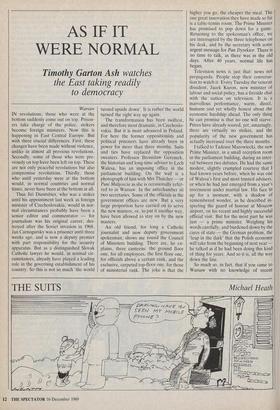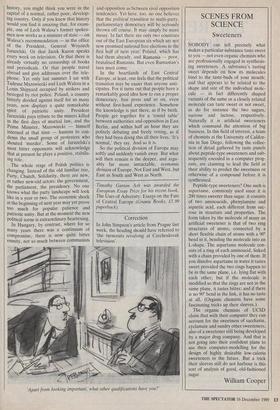AS IF IT WERE NORMAL
Timothy Garton Ash watches
the East taking readily to democracy
Warsaw IN revolutions, those who were at the bottom suddenly come out on top. Prison- ers take charge of the police, stokers become foreign ministers. Now this is happening in East Central Europe. But with three crucial differences. First, these changes have been made without violence, unlike in almost all previous revolutions. Secondly, some of those who were pre- viously on top have been left on top. These are not only peaceful revolutions but also compromise revolutions. Thirdly, those who until yesterday were at the bottom would, in normal countries and normal times, never have been at the bottom at all.
Thus Jiri Dientsbier, who was a stoker until his appointment last week as foreign minister of Czechoslovakia, would in nor- mal circumstances probably have been a senior editor and commentator — for journalism was his original career, des- troyed after the Soviet invasion in 1968. Jan Carnogursky was a prisoner until three weeks ago, and is now a deputy premier with part responsibility for the security apparatus. But as a distinguished Slovak Catholic lawyer he would, in normal cir- cumstances, already have played a leading role in the governing establishment of his country. So this is not so much 'the world turned upside down'. It is rather the world turned the right way up again.
The transformation has been swiftest, and therefore most dramatic, in Czechoslo- vakia. But it is most advanced in Poland. For here the former oppositionists and political prisoners have already been in power for more than three months. Suits and ties have replaced the opposition sweaters. Professor Bronislaw Geremek, the historian and long-time adviser to Lech Walesa, has an imposing office in the parliament building. On the wall is a photograph of him with Mrs Thatcher — or Pani Malgoscia as she is occasionally refer- red to in Warsaw. In the antechamber sit two secretaries. Some of the officials in the government offices are new. But a very large proportion have carried on to serve the new masters, or, to put it another way, have been allowed to stay on by the new masters.
An old friend, for long a Catholic journalist and now deputy government spokesman, shows me round the Council of Ministers building. There are, he ex- plains, three canteens: the ground floor one, for all employees, the first floor one, for officials above a certain rank, and the exclusive, carpeted top-floor one, for those of ministerial rank. The joke is that the
higher you go, the cheaper the meal. The one great innovation they have made so far is a table-tennis room. The Prime Minister has promised to pop down for a game. Returning to the spokesman's office, we are interrupted by the three telephones on his desk, and by the secretary with some urgent message for Pan Dyrektor. There is no time to talk, as there was in the old days. After 40 years, normal life has begun.
Television news is just that: news not propaganda. People stop their conversa- tion to watch it. Every Tuesday the veteran dissident, Jacek Kuron, now minister of labour and social policy, has a fireside chat with the nation on television. It is a marvellous performance, warm, direct, humane and yet wholly honest about the economic hardship ahead. The only thing he can promise is that no one will starve. Prices have already soared, yet, amazingly, there are virtually no strikes, and the popularity of the new government has actually increased over the three months.
I talked to Tadeusz Mazowiecki, the new Prime Minister, in a small reception room in the parliament building, during an inter- val between two debates. He had the same modest, slightly crumpled courtesy that I had known years before, when he was one of Walesa's first and most trusted advisers, or when he had just emerged from a year's internment under martial law. His face lit up for a moment, with a shadow of remembered wonder, as he described in- specting the guard of honour at Moscow airport, on his recent and highly successful official visit. But for the most part he was just — a prime minister. Weighing his words carefully, and burdened down by the cares of state — the German problem, the `leap in the dark' that the Polish economy will take from the beginning of next year he talked as if he had been doing this kind of thing for years. And so it is, all the way down the line.
So much so, in fact, that if you came to Warsaw with no knowledge of recent history, you might think you were in the capital of a normal, rather poor, develop- ing country. Only if you knew that history would you find it amazing that, for exam- ple, one of Lech Walesa's former spokes- men now works as a minister of state — on Walesa's recommendation — in the office of the President, General Wojciech Jaruzelski. Or that Jacek Kuron speaks every week on television. Or that there is already virtually no censorship of books and periodicals. Or that people travel abroad and give addresses over the tele- phone. Yet only last summer I sat with Tadeusz Mazowiecki and Lech Walesa in a Lenin Shipyard occupied by strikers and besieged by riot police. Poland, a country bitterly divided against itself for so many years, now displays a quite remarkable spirit of patriotic unity. President Jaruzelski pays tribute to the miners killed in the first days of martial law, and the Prime Minister, Mazowiecki — himself interned at that time — hastens to con- demn the small group of protesters who shouted 'murder'. Some of Jaruzelski's most bitter opponents will acknowledge that at present he plays a positive, stabilis- ing role.
The whole stage of Polish politics is changing. Instead of the old familiar trio, Party, Church, Solidarity, there are new, or rather new-old actors: the government, the parliament, the presidency. No one knows what the• party landscape will look like in a year or two. The economic shock at the beginning of next year may yet prove too much for popular patience and patriotic unity. But at the moment the new political scene is extraordinary heartening.
In Hungary, by contrast, where for so many years there was a continuum of compromise, there is now quite bitter enmity, not so much between communists 'Apart from looking important, what other qualifications have you?' and opposition as between rival opposition tendencies. Yet here, too, no one believes that the political transition to multi-party, parliamentary democracy will he seriously thrown off course. It may simply be more messy. In fact there are only two countries out of the East European six which are not now promised national free elections in the first half of next year: Poland, which has had them already, and Rumania — poor, brutalised Rumania. But even Rumanian's turn must come.
In the heartlands of East Central Europe, at least, one feels that the political transition may be easier than anyone anti- cipates. For it turns out that people have a remarkably good idea how to run a proper democracy, free press and so on, even without first-hand experience. Somehow the knowledge is just there, as if by birth. People get together for a 'round table' between authorities and opposition in East Berlin, and within half an hour they are politely debating and freely voting, as if they had been doing this all their lives. 'It's normal,' they say. And so it is.
So the political division of Europe may softly and suddenly vanish away. But what will then remain is the deeper, and argu- ably far more intractable, economic division of Europe. Not East and West, but East as South and West as North.
Timothy Garton Ash was awarded the European Essay Prize for his recent book, The Uses of Adversity: Essays on the Fate of Central Europe (Grants Books, £5.99 paperback)



















































 Previous page
Previous page